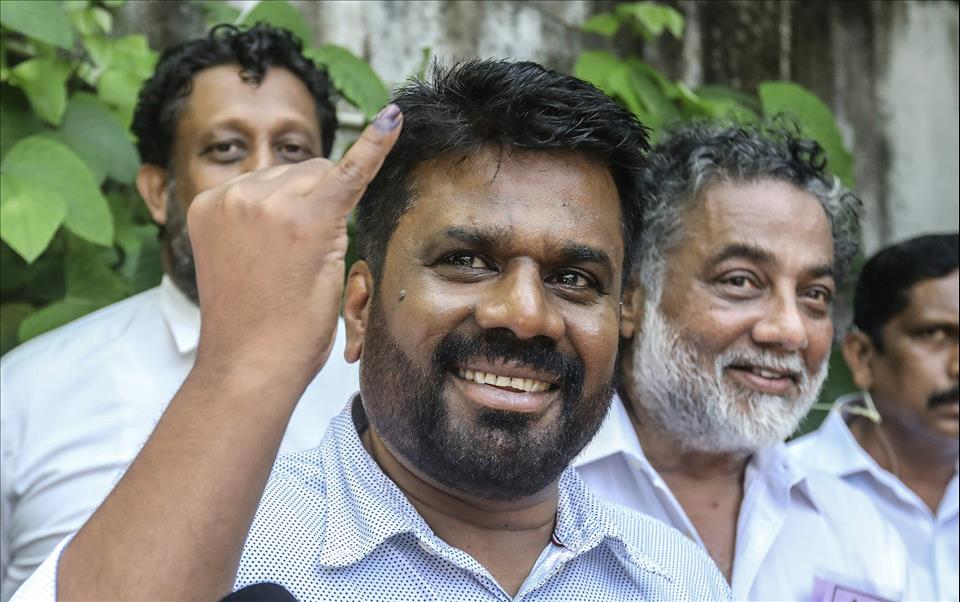
Sri Lanka's New Leftist President Marks Departure From Political Family Rule
His election is something of a watershed. It was the first time since Sri Lanka gained independence in 1948 that the presidential race was decided by a second round of counting after either of the top two candidates failed to win the mandatory 50% of the vote. And it was also the only time that voters have elected a candidate who does not belong to the country's traditional ruling elite.
Sri Lanka has long been held in the tight grip of a handful of powerful political families. The Rajapaksa dynasty, for example, had dominated Sri Lankan politics for well over two decades before mass protests over a severe economic crisis unseated the country's leader, Gotabaya Rajapaksa , in 2022.
AKD's campaign rhetoric centred largely around corruption as the key culprit in the economic woes facing the country. Previous governments have been linked not only to corruption , but also to human rights abuses and the military's encroachment on the civilian space. Persuaded by his logic of openness and transformation, voters saw AKD as an opportunity to change Sri Lanka's stale political system.
Following his election, AKD declared in characteristic Marxian mode:“This victory belongs to all of us.” Assuaging the demands of the masses for change will be a priority.
Voters have chosen a new president for the first time since mass protests unseated Sri Lanka's leader in 2022. Color Collector / Shutterstock
AKD comes from a strong leftwing ideological background. He leads a political outfit called the Janatha Vimukti Peramuna (JVP), which is by no means a heavyweight party. It has only three members in the country's 225-member parliament, and does not come with an attractive pedigree.
The JVP is seen in Sri Lanka as a fringe reactionary party due to its involvement in violent insurrections and targeted assassinations that left thousands dead in the 1980s. Given Sri Lanka's fractious ethno-nationalist politics, how the JVP and its new national leader carry the masses forward on a national regeneration project would be anybody's guess.
But AKD has shown himself to be aware of the underlying tensions in the country and, since becoming the JVP's leader in 2008, has apologised for the party's past violence. In his swearing-in speech, AKD declared :“We need to establish a new clean political culture ... We will do the utmost to win back the people's respect and trust in the political system.”
The road aheadThere are several critical challenges that AKD needs to face head on – the most important of which concerns the country's failing economy. After all, it was acute economic hardship that drove the citizenry to vote for political change.
In the past, a substantial portion of whatever Sri Lanka managed to procure through its two main sources of income, tourism and remittances sent home by citizens living abroad, went towards settling its external debts. However, these earnings were hit badly by the pandemic and the country's economic woes spiralled out of control.
The rate of inflation soared and dwindling reserves of foreign currency resulted in acute shortages of essential goods and services. Then, in May 2022, Sri Lanka defaulted on its foreign debt for the first time in its history.
This scenario quickly led to a national emergency. Faced with the most devastating economic crisis since independence, a countrywide uprising (colloquially known as the aragalaya) ousted Gotabaya Rajapaksa from office.
The removal of Rajapaksa secured an uneasy peace, and things have since tentatively improved on the economic front. Ranil Wickremesinghe took over as the interim president in 2022 and his administration managed to secure a loan worth US$3 billion (£2.2 billion) from the International Monetary Fund.
The economy now appears to be on a slow path of recovery . It is expected to grow in 2024 for the first time in three years, supported by a narrower trade deficit and growing remittances.
Sri Lanka's interim president, Ranil Wickremesinghe, has congratulated Dissanayake on winning the election. Ruwan Walpola / Shutterstock
AKD is aware of the enormity of the burden he carries. As he admitted while accepting the role of president:“I have said before that I am not a magician – I am an ordinary citizen. There are things I know and don't know. My aim is to gather those with the knowledge and skills to help lift this country.”
His pro-working class and anti-political elite campaigning without doubt made AKD popular among youth, and helped him secure victory. But his ideology may well be at odds with the foreign lenders who have kept the economy afloat for past two decades.
Sri Lanka's new president faces a precarious balancing act to satisfy both a population high on hopes of populist subsidies and the demands of external lenders to tighten the country's belts.

Legal Disclaimer:
MENAFN provides the
information “as is” without warranty of any kind. We do not accept
any responsibility or liability for the accuracy, content, images,
videos, licenses, completeness, legality, or reliability of the information
contained in this article. If you have any complaints or copyright
issues related to this article, kindly contact the provider above.


















Comments
No comment